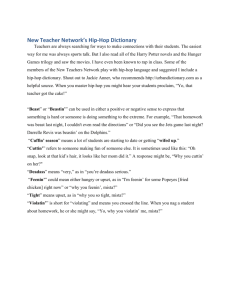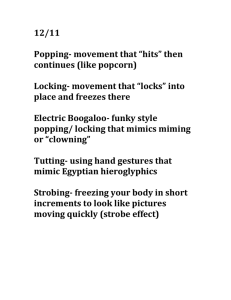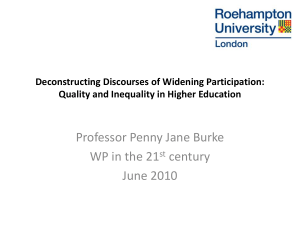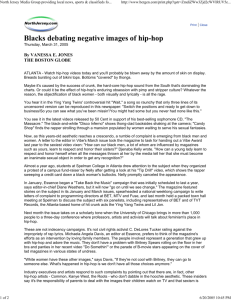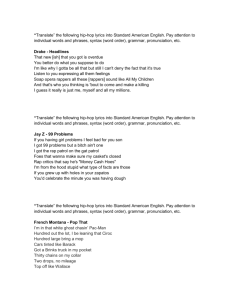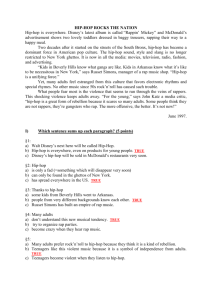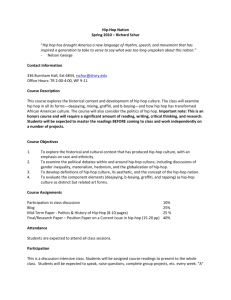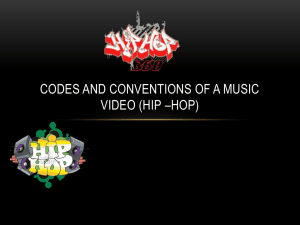Shake your Moneymaker - Eastern Michigan University
advertisement
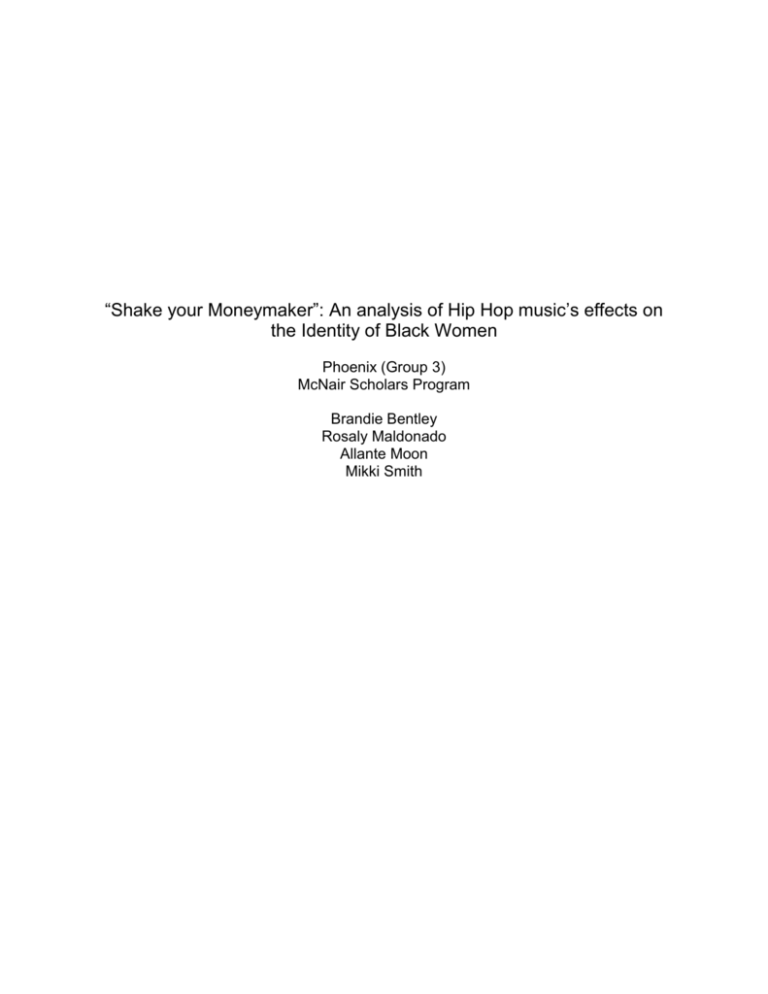
“Shake your Moneymaker”: An analysis of Hip Hop music’s effects on the Identity of Black Women Phoenix (Group 3) McNair Scholars Program Brandie Bentley Rosaly Maldonado Allante Moon Mikki Smith Abstract Hazzard- Donald (1996) defines “Hip-Hop” as a genre originating among marginalized African American youth .The art of Hip Hop began in the late 1970’s and has continued to grow as a phenomenon since then (Traber 2012). Today, Hip Hop is identified as not only a music genre’ but an urban lifestyle many people have adopted as their own. Incorporating hip hop culture into the rituals of everyday life has made it a marker of the Black Youth subculture (Clay, 2003). According to Stephanie Shonekan (2010), through listening to Hip Hop, similar ideas can be exchanged between the musicians and the listener. As a result, powerful messages can easily be transmitted through hip hop and used to either empower or discourage African American youth (Shonekan 2010). In many music videos, the physical aspects of Black women are amplified and sex is used as a way to sell the music, regardless of the artist’s gender, as well as the brand they are promoting (Balaji 2010). Although many mainstream artists embrace the sexualized culture, there are others who seek to empower and uplift women through Hip Hop. Performers such as Queen Latifah and Erykah Badu have used varying degrees of feminism in their careers as a weapon of empowerment (Emerson 2002). Many messages are conveyed in Hip-Hop, but the question remains: which messages have an impact on the young Black women who listen to Hip-Hop, and do not.This research will examine the effects of listening to Hip-Hop music may have on the identity of young Black women. For this study, ages 18-25 will serve as our sample age range for the focus groups conducted. Each group will listen to 2 Hip- Hop songs and discuss them with a facilitator. Introduction Mass media sources are notorious for the notion of inferiority that black women have been placed in historically (Balaji 2010). Many western works of literature and film have categorized Black women as both large and matronly, or as a primitive and sexually charged beings (Balaji 2010). With the explosion of Hip-Hop and the exporting of images and music videos featuring young Black women dancing provocatively, the idea of the “video vixen” life has become a negative representation of what Black women are in society ( Balaji 2010). This paper will examine the influence hip-hop music has on the self- image young Black women develop. Literature Review Hip-Hop’s Influence on the Identity Development of Black Female College Students (Henry, Jackson, West, 2010) examines how the Hip-Hop culture impacts the identity development of Black Women in general, but more specifically Black female college students. Hip-Hop is commonly described as one of the most influential lifestyles among young people, and college campuses have not escaped the pervasive effects of Hip-Hop culture (Evelyn, 2000). Through the use of various reviews of literature, the authors assert that Hip-Hop has an influence on the fashion trends, dating decisions, and the overall self-perception that Black women create for themselves as a young adult. As Hip-Hop spreads widely throughout the Black culture, it’s messages have been found to be both degrading and empowering, and as a result can be found to both damage and defend the identity of young Black women (Henry, Jackson, West, 2010). Exposing women to both subjectivity and empowerment, Hip-Hop plays a large role in the way that Black women act and view themselves. As Henry, Jackson, and West (2010) state, “some Black women may not have the sufficient internal resources, nor external stimuli to appropriately filter the divergent messages of Hip-Hop.” This article supports the belief that Hip-Hop is a prevalent force acting to shape and develop the identity of Black women, and that development can be either positive or negative. In a research article by Kistler (2009), four specific points were addressed for guiding the hypothesis: (1) the effects of sexual Hip-Hop video exposure on women among the male participants; (2) the effects of hip-hop video exposure on sexual permissiveness; (3) the effects of Hip-Hop video exposure on gender attitudes; (4) the effects of Hip-Hop video exposure on acceptance of rape myths. The focus of group experimental design was college women. The two experimental conditions were extremely sexual videos and a low sexual content videos. The results of the study showed that male participants who were exposed to Hip-Hop music of sexual content expressed greater objectification of women. The effects were significant in women. The results of hypothesis one was as predicted, those who watched the highly sexual hiphop videos exhibited a higher level of objectification of women (2009). The hypothesis two results showed that male participants who watched the highly sexual hip-hop videos rated sexual permissiveness higher than those who watched the low sexual hip-hop videos (2009). The hypothesis three showed that women participants who watched the highly sexual hip-hop videos exhibited a higher level of traditional gender attitudes (2009). Those who watched the highly sexual hip-hop videos exhibited a higher level of rape acceptance than those in the low-sexual condition. These results have shown that listening to hip hop music does affect the perceptions of women. Kalof (1999) surveyed that female college students exposed to a sexually stereotyped music video indicated greater acceptance of interpersonal violence. It was identified that people who are fans of Hip-Hop and seek out this genre already carry certain attitudes towards the objectification of women. In a research article by Balaji (2010), the ambiguity that has surfaced due to the vast differences in images that represent black womanhood from BET and VH1 versus the selfconceptualized role that women who play “video vixens” have built for themselves outside of their work is reviewed. The researcher set out to “build on the idea that Black women can use their sexuality as a tool of resistance against attempts at objectification and commodification” (Balaji 2010). In order to credit this belief, the author used a textual analysis as well as the perspective of a noted music video performer, Melyssa Ford, to support the notion of empowerment that some women can receive from the hip- hop culture. The research presented focused mainly on the personal account of the video dancer Melyssa Ford. Although each of her quotes have supported the notion that women are able to become empowered in their given roles in Hip-Hop, there is still much criticism if the empowered effects reigns true for other women within the Hip-Hop industry (Balaji 2010). J.N Ross and N.M. Coleman directed a study comprised of undergraduate Black women at an Urban University. The mean age of the sample was 22 years old. Their research was a quantitative study which provided participants with two scripts, the “gold digger” and the “video girl” script. The participants were provided with envelopes that contained a descriptive statement of the script, a ranking sheet, a brief questionnaire and instruction for completing the task. J.N. Ross and N.M. Coleman found that their study indicated that African American women’s sexuality is portrayed through Hip-Hop as a way to acquire material items using their sexuality as a means. This study supports the idea that hip hop can have an effect on the identity women claim as their own because of the way Black women are portrayed through Hip-Hop. The works presented in this literature review focused on the negative and positive role Hip-Hop music plays in the identity Black women take as their own. One of the main topics that should be further researched is the variance in perception found among Black women of various, socio-economic standpoints in relation to the roles that Black women play in Hip-Hop. The current research does not extend to those parameters, which makes it difficult to perceive that the given research is a full representation of ideals held by all Black women who listen to Hip-Hop. In the research that will be conducted, this factor will be highly considered is not valid for all of Hip-Hop. Some artists, including Missy Elliott and Lauryn Hill use music as a way to celebrate women and to empower themselves, and insert independent of male counter parts. Budget We request a total of $355 to undertake the study described above. A amount of $70 of this amount will be used to buy the Statistical Package for the Social Sciences software to analyze the data from the surveys that participants will be filling out. The focus group will have 8 participants and each participant will be rewarded $15 for their participation. We will also purchase an audio recorder with $30 to keep track of what is said in the focus group and $15 will be used to print surveys and handouts for the focus group. Methodology For this research, two focus groups will be conducted with females from minority races aged 18-24. One focus group will be implemented at Eastern Michigan University and the other at Wayne State University. These focus groups will be constructed of 8 women, each. Each focus group will listen to two Hip- Hop based songs. One song will be by a male rap artist and the other by a female rap artist. Both songs will be unedited versions in order to give the participants a full opportunity to decide on the quality of each song. Participants will then work with their group and facilitator to answer questions regarding the effects that songs like the ones played as well as the hip hop culture has on their personal identity, including their sexual expression, future goals and aspirations, and self-perception. Surveys will also be distributed outside of the focus groups on both college campuses to college women from 18-24 and be filled out anonymously. This survey will be asking many if the same questions asked in the focus groups however, these questions will be rated on a Likert scale. We hope to have more accurate outcomes by providing two studies and hopefully receive a larger pool of opinions. References Balaji, M. (2010). Vixen resistin’: Redefining black womanhood in hip-hop music videos. Journal of Black Studies, 41(1), 5-20. Henry, W. J., West, N. M., & Jackson, A. (2010). Hip-hop's influence on the identity development of black female college students: A literature review. Journal of College Student Development, 51(3), 237-251. Kistler, M. E., & Lee, M. J. (2010). Does exposure to sexual hip-hop music videos influence the sexual attitudes of college students? Mass Communication & Society, 13(1), 67-86. Ross, Jasmine N., and Nicole M. Coleman. "Gold Digger or Video Girl: The Salience of an Emerging Hip-hop Sexual Script." Taylor & Francis Online. Routledge, 22 Oct. 2010. Web. 01 Nov. 2014.
